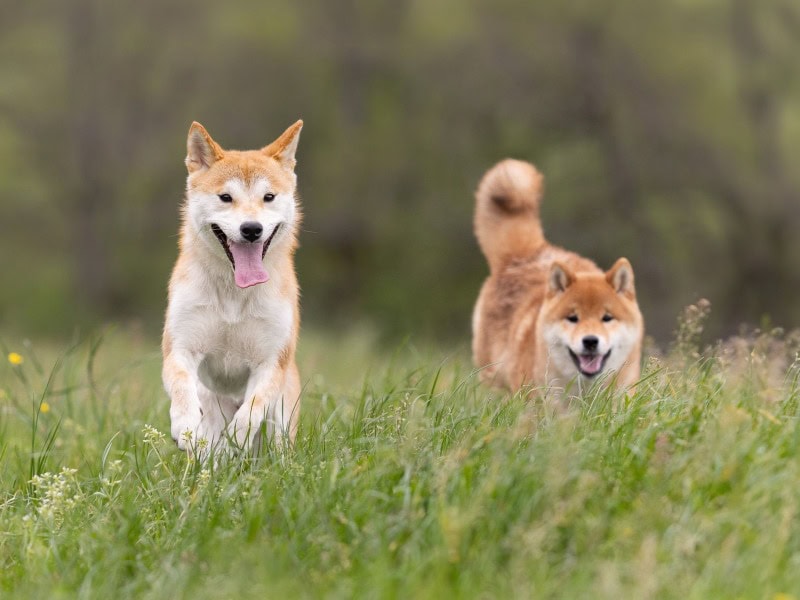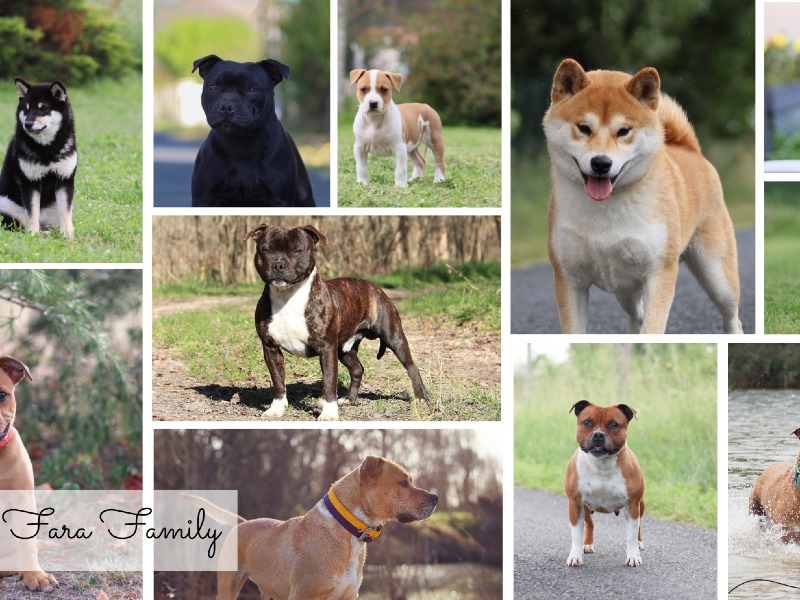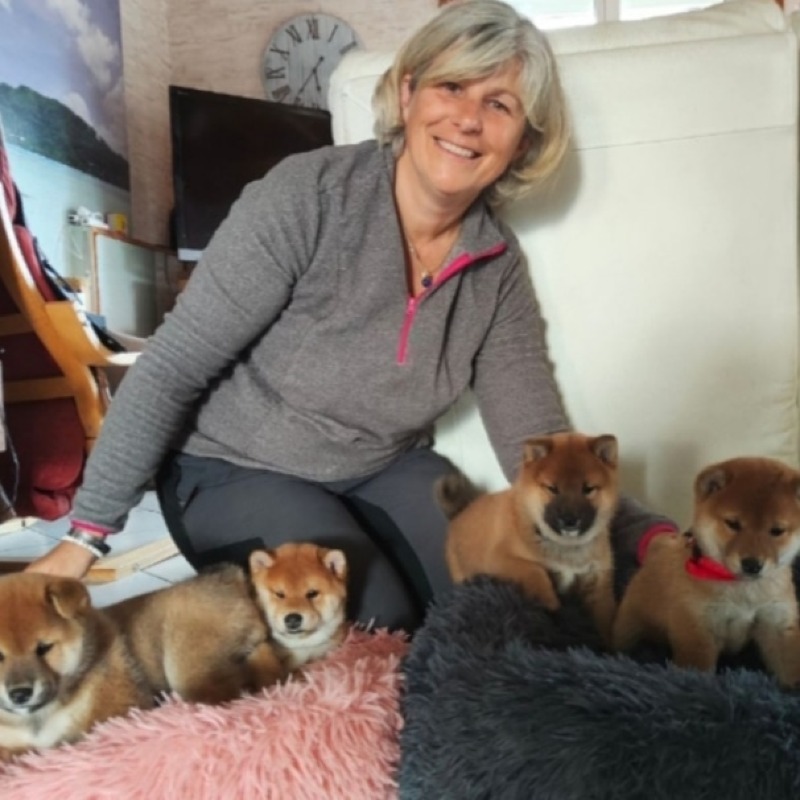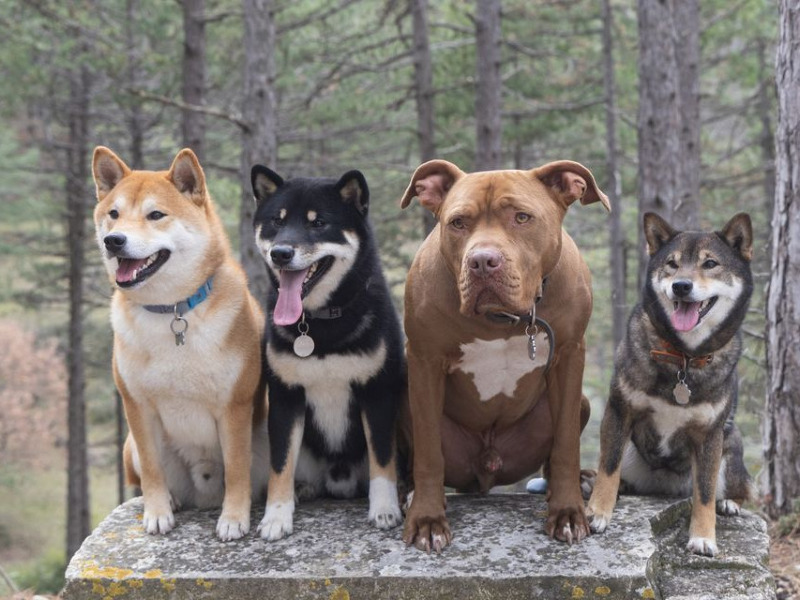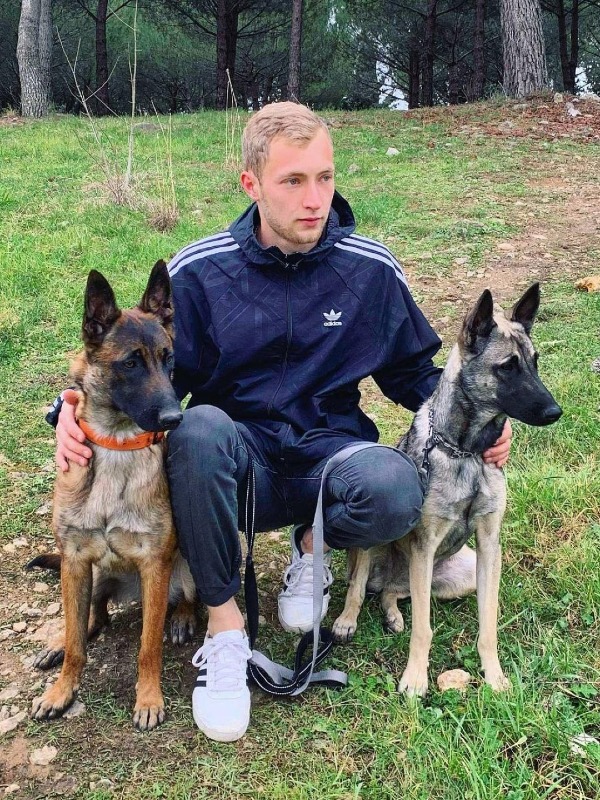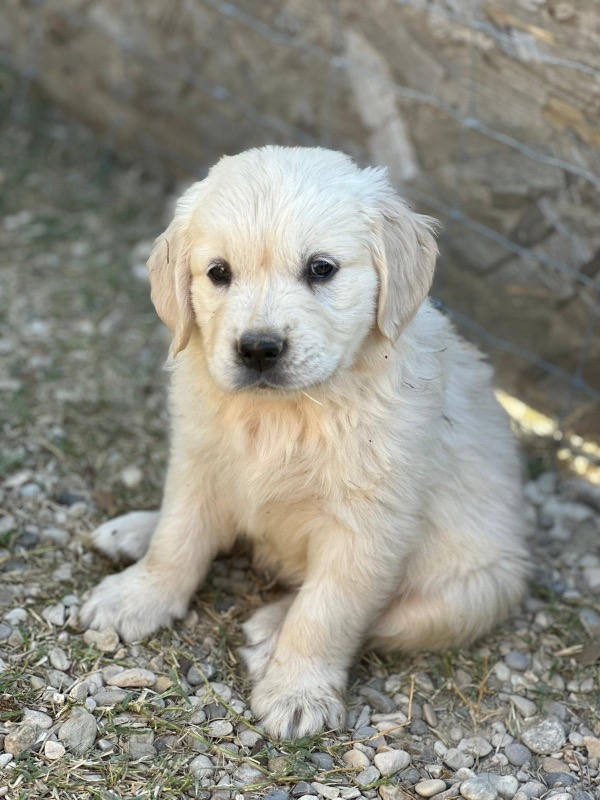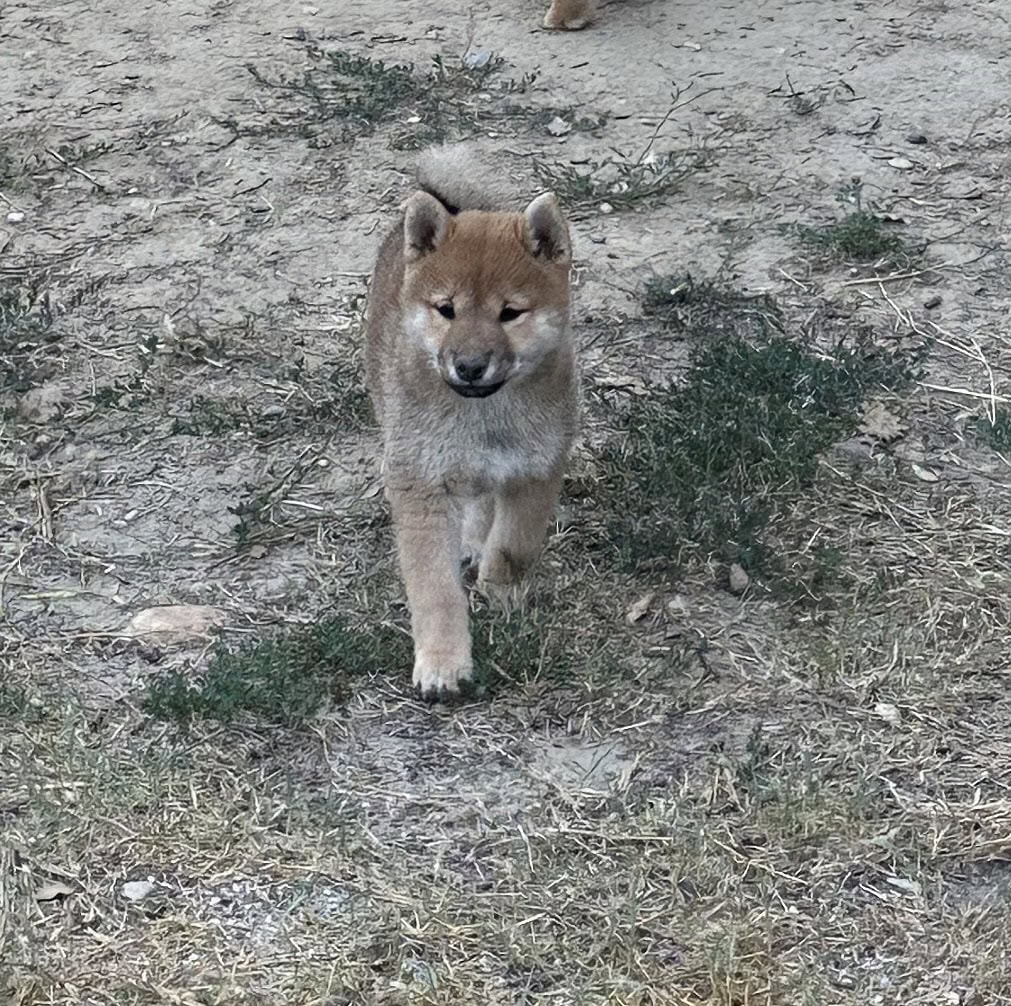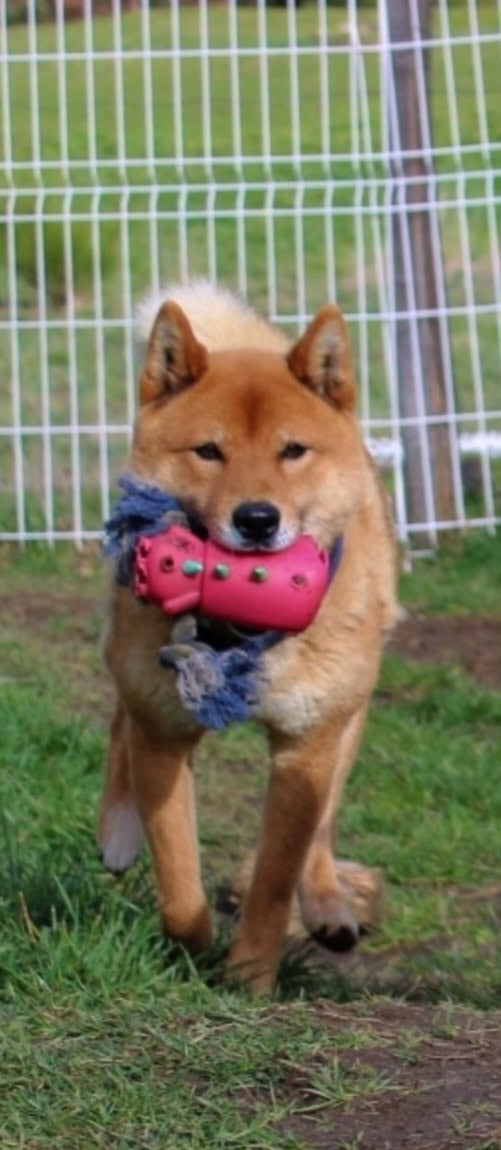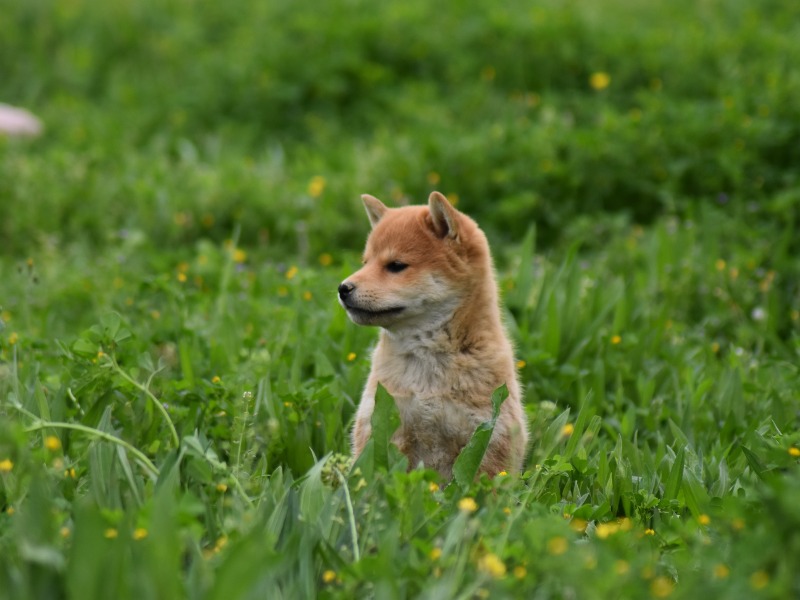Shiba-inu
Autres noms : Japanese dogs, Small size dog japanese, Shobe, Shibe, Shober
Discover the Shiba Inu, a Japanese dog known for its independent nature and lively personality. With its muscular appearance, erect ears, and dense coat, the Shiba Inu combines beauty and charm. Learn more about its traits, behavior, and care to better understand this fascinating breed.
Awareness of acquiring an animal
Adopting or breeding a dog is a responsibility that must be carefully considered. Dogs are loyal companions that require time, attention, and constant care. Whether for leisure, passion, or professional breeding, it is crucial to understand the specific needs of each breed. Provide them with a loving and stimulating environment, and avoid any impulsive acquisition that could harm their well-being. Be a vigilant and committed owner for a happy and healthy companion.
To learn more about animal welfare, we invite you to consult our FAQ by clicking the button below:
Origins and history
The Shiba Inu is a dog breed originating from Japan, known for its compact size and independent nature. Its origins date back over 2,000 years, a time when these dogs were primarily used for hunting birds and small game in the Japanese mountains. Their agility and developed sense of smell made them loyal companions for hunters.
Over the centuries, the Shiba Inu has gone through difficult periods, particularly during World War II. The war significantly reduced their population, leading them to the brink of extinction. However, thanks to the efforts of enthusiasts and breeders, the breed was restored after the war, with a focus on preserving its original physical and behavioral characteristics.
Today, the Shiba Inu is recognized as a cultural symbol in Japan. Its distinct appearance, with its red coat, curled tail, and lively expression, has made it a popular breed both as a pet and as a member of pop culture, particularly through social media. Intelligent and independent, it requires firm training, but remains a faithful and affectionate companion for those who devote time and attention to it.
Physical characteristics
The Shiba Inu is a medium-sized dog characterized by a compact and harmonious silhouette. Its stature is well-proportioned, with a height at the withers ranging from 35 to 43 cm, and a weight oscillating between 8 and 14 kg. Its body is robust and muscular, which gives it great agility.
The coat of the Shiba Inu is one of its most distinctive features. It is double-layered, consisting of a dense and soft undercoat and a rougher, straighter outer coat. This double layer provides good insulation, protecting it from the elements. The most common coat colors include red, sesame, black and tan, as well as cream.
The ears of the Shiba Inu are small, triangular, and erect, adding to its bright and alert expression. Its face is marked by expressive features, with almond-shaped eyes that convey a keen intelligence. The tail, curled over the back or to the side, is another emblematic element of its appearance, giving it an elegant and dynamic look.
Character
The Shiba Inu is a dog breed that stands out for its lively personality and independent nature. These dogs are often described as alert and curious, always ready to explore their surroundings. Their proactive nature and hunting instincts make them both interesting and sometimes unpredictable companions.
In terms of behavior, the Shiba Inu possesses a strong will and great determination. This independence can make them somewhat stubborn, which requires consistent and positive training. While these dogs are affectionate toward their family, their temperament can make them reserved with strangers. They are particularly loyal to their owners, developing deep and protective bonds.
On the other hand, these dogs are also known for their agility and liveliness. They are very energetic and require regular exercise to stay healthy and happy. Their personality often plays a role in their ability to adapt to various environments, whether in an apartment or in larger spaces. In short, the Shiba Inu is a loyal and enthusiastic companion, ideal for owners who can appreciate its distinctive character and specific needs.
Life expectancy
The life expectancy of a Shiba Inu is generally estimated to be between 12 and 15 years. This remarkably high longevity for a medium-sized dog is the result of several factors, including its robust physical constitution and overall health outlook. Shiba Inus are known to be resilient dogs, but like any breed, they can be prone to certain health conditions.
Among the most common health issues are hip dysplasia, eye diseases such as cataracts, and skin problems. Paying special attention to their preventive health care, including regular veterinary visits and a balanced diet, can help improve their quality and longevity of life. Adequate physical activity and mental stimulation are also essential for keeping a Shiba Inu in good shape.
To maximize the lifespan of these dogs, it's important to provide them with a loving and stable environment. Social interactions, both with humans and other animals, play a crucial role in their overall well-being. In summary, with proper care and attention to their specific needs, a Shiba Inu can live a long and fulfilling life.
Exercise and activity needs
The Shiba Inu, a dog breed originating from Japan, is known for its independent and active personality. Its exercise needs are essential to ensure its physical and mental well-being. Generally, it requires at least an hour of daily exercise, divided between walks, playtime, and stimulating activities. It is particularly agile and enjoys running, making it an excellent companion for outdoor activities.
Social interaction is also crucial for this breed. Although it may seem aloof, the Shiba Inu enjoys playtime with its owners and other dogs. Games like fetching or agility courses will help expend its energy and strengthen the bond with its owner. Socialization from a young age is recommended to prevent fearful or uninhibited behaviors in adulthood.
Lastly, mental activities, such as interactive toys, are equally important. The Shiba Inu is intelligent and needs challenges to avoid boredom. A balance between physical and mental training is therefore essential for a harmonious and fulfilling life. By providing an active and stimulating environment, owners can ensure a happy life for their companion.
Recommended diet
The Shiba Inu is an active and independent dog breed that requires a diet suitable for its metabolism. It is crucial to choose high-quality food that is rich in animal proteins to support its muscle mass and energy levels. Natural ingredients and varied protein sources, such as chicken, fish, or lamb, are recommended.
As they age, Shiba Inus can be prone to obesity, so it is important to monitor their food portions. The frequency of meals should be adjusted based on the dog's age, activity level, and health. Generally, it is advised to feed them two meals a day, which helps maintain a healthy weight.
Fats are also essential in their diet but should come from quality sources. Omega-3 and omega-6 fatty acids contribute to healthy skin and a shiny coat. Finally, it is important to ensure proper hydration by always providing access to fresh water. Regular veterinary check-ups will help adjust the diet according to the dog's specific needs.
Training and obedience
The Shiba Inu is a Japanese dog breed known for its lively and independent personality. For successful training, it is crucial to start at a young age. Socialization is essential, as this breed can be reserved toward strangers. Exposing the puppy to various people, animals, and environments will help it become a balanced adult.
Training should be based on positivity and rewards. Shiba Inus are intelligent but can be somewhat stubborn, so it is essential to be patient. Use treats and praise to encourage desired behaviors. Training sessions should be short and engaging to maintain the dog's interest.
Additionally, a good living environment and stimulating activities are necessary to avoid boredom, as this breed has a high need for exercise. Interactive games and daily walks will help channel their energy. A well-trained, socialized, and exercised Shiba Inu will be a happy and fulfilled companion.
Behavior with children
The Shiba Inu is a dog breed originating from Japan, known for its lively character and independence. When it comes to interacting with children, this dog exhibits both positive and negative traits. Generally, it can be an excellent companion for children, but certain precautions should be taken.
First, socialization is essential for a Shiba Inu. It is crucial to expose them from a young age to different environments, people, and situations, including children. When well-socialized, the Shiba Inu can learn to enjoy the company of younger ones and interact with them in a friendly manner.
However, the independent and sometimes stubborn nature of this breed can also present challenges. Shiba Inus are not always inclined to show patience, especially if a child is too rowdy or does not respect their personal space. Therefore, parents must teach children how to interact with the dog, emphasizing calmness and respect for its boundaries.
It is also advisable to supervise interactions between the Shiba Inu and children, especially if they are very young. Ensuring good canine education and managing behaviors can facilitate harmonious coexistence. This dog can become a loyal and protective friend for children, provided that the foundations of a positive relationship are firmly established.
Compatibility with Other Animals
Shiba Inus are independent and often stubborn dogs, which can affect their compatibility with other pets. Generally, they have a well-developed hunting instinct, leading them to chase small animals such as rodents and birds. This tendency can create problems in environments where other pets are present, particularly rodents or birds, as their natural instincts may take over.
However, with early socialization and proper training, Shiba Inus can learn to coexist with other animals, including dogs and cats. The key lies in a gradual introduction, where each encounter is controlled and positive. Owners must carefully monitor interactions and intervene quickly if any tensions arise.
Shiba Inus tend to be dominant and may sometimes exhibit protective behavior toward their space and family. This is why it is crucial to establish clear rules to avoid conflicts. If these dogs are well-socialized from a young age, they can become friendly companions for other pets, but this requires time and effort.
Grooming needs
The Shiba Inu is a dog breed that requires regular maintenance to keep its health and appearance. In terms of grooming, these dogs have a double coat: a dense undercoat and a smoother outer layer. To prevent matting and reduce shedding, weekly brushing is recommended. During shedding periods, which typically occur in the spring and fall, more frequent brushing, even daily, will be necessary to manage the amount of hair lost.
Regarding baths, it's important not to overdo it. A bath every two to three months is generally sufficient, unless there is a specific need, such as dirty activities or skin issues. Using shampoos specifically formulated for dogs is essential to avoid skin irritations.
In addition to coat grooming, maintenance needs also include regular checks of the ears and teeth. Ears should be gently cleaned to prevent infections, while brushing the teeth at least two to three times a week will contribute to oral health. Finally, nail trimming is necessary, as excessive length can cause discomfort or injury. In summary, regular and appropriate maintenance is essential for ensuring the well-being of a Shiba Inu.
Health
The Shiba Inu is a dog breed appreciated for its lively personality and charming appearance. However, as with any breed, there are specific health concerns that should be taken into account. Potential owners need to be aware of hereditary diseases that may affect this breed.
One of the most common conditions in Shiba Inus is hip dysplasia. This joint deformity can lead to arthritis and chronic pain. Responsible breeders perform health tests to minimize the risk of transmitting this condition. Another concern is patellar luxation, which can occur in some individuals, causing reduced mobility and pain.
The Shiba Inu is also prone to eye problems, such as entropion, where the eyelid turns inward. This can cause irritations and may require surgical intervention if left untreated. Skin allergies are also common, necessitating special attention to the dog’s diet and environment.
To ensure the health of a Shiba Inu, it is essential to follow a regular care program with a veterinarian, including vaccinations, health check-ups, and appropriate nutritional monitoring. Promoting an active and balanced lifestyle will also contribute to the longevity and well-being of this energetic and affectionate dog.
Environment and habitat
The Shiba Inu is a breed originally from Japan, where it has traditionally been used for hunting. This compact and agile dog adapts particularly well to different environments, although it is often considered an ideal companion animal for families living in urban or suburban areas. Due to its moderate size, it can live comfortably in an apartment, as long as it receives regular exercise.
In terms of habitat, the Shiba Inu prefers a fenced or secure space, as it is known for its curiosity and hunting instinct. A well-designed garden with a sturdy fence is ideal, as this breed loves to explore and run. However, a simple park is enough to meet its outdoor activity needs.
From an environmental perspective, it is important to ensure that the Shiba Inu has regular access to walks and playtime. A good balance between physical activity and mental stimulation is essential to prevent destructive behaviors. Allowing this dog to interact with other dogs and people also contributes to its overall well-being.
Name ideas
Choosing a name for a Shiba Inu can be an exciting yet delicate process. First, it is essential to consider your dog's personality. Shiba Inus are often described as independent, lively, and full of character. A name that reflects these traits can be an excellent choice. Also, think about the sound of the name; it should be easy to pronounce and recognize for your four-legged companion.
Moreover, avoid names that are too long. A short name or a word with one or two syllables is generally more effective, as it is easier for the dog to associate it with commands or recalls. Finally, make sure to choose a name that you love and that makes you smile, as you'll need to use it often.
Here are some suggestions for a Shiba Inu: Kiko, Kenji, Suki, Yuki, Taro, Hoshi, Miko, Riku, Sora, Niko, Aiko, Rina, Kira, Toshi, and Fumi. Each name evokes a touch of Japanese culture and harmonizes with the dynamic and playful spirit of this breed.
Average purchase price
The purchase price of a Shiba Inu dog can vary significantly based on several factors. Generally, the average cost ranges between 1,500 and 3,000 euros. This price range is influenced by breeders, reputation, and the quality of the bloodlines. Recognized breeders who practice rigorous selection tend to set higher prices due to health guarantees and breed characteristics.
In addition to the quality of the breeding, geographical location plays a key role in the price. In some areas, the demand for this breed may be higher, resulting in increased prices. Furthermore, market conditions, such as the availability of litters, also influence the cost. Peak demand periods, like holidays, can drive prices up.
It is also important to consider the additional expenses related to acquiring a dog. Vaccinations, veterinary check-ups, starter supplies, and potential spaying/neutering can add several hundred euros to the initial cost. Thus, even if the purchase price may seem attractive, the total financial commitment should be carefully evaluated.
Expenses
Owning a Shiba Inu involves regular expenses that can vary depending on several factors. On average, owners should budget between 150 and 250 euros per month to ensure their pet's well-being.
First of all, food constitutes a significant part of the budget. Shiba Inus need a quality diet to maintain their health. You should expect to spend between 40 and 80 euros per month on suitable kibble. Regular veterinary visits, which include vaccinations and any necessary medical care, will also represent a significant cost. Approximately 15 to 30 euros per month can be budgeted for this, although this amount may vary depending on the specific needs of each dog.
Don’t forget hygiene-related expenses, such as grooming and dental care, which can amount to around 20 to 40 euros per month. Finally, it is essential to consider the costs associated with accessories, such as toys, leashes, and bedding, which can add an additional 10 to 30 euros each month.
In summary, the monthly budget for a Shiba Inu ranges from 150 to 250 euros, depending on the owners' choices and the specific needs of the animal.
Destination and usage
The Shiba Inu is a dog breed originating from Japan, valued for its affectionate temperament and liveliness. As a pet, it is particularly popular in households due to its independent yet endearing character. Shiba Inu owners often find that these dogs form strong bonds with their family while still maintaining a degree of autonomy.
Shiba Inus are distinguished by their compact size, making them suitable for apartments and homes with limited space. They are also very adaptable to different environments as long as they receive enough exercise. Additionally, their dense and well-protected coat makes them resilient to the elements, making them pleasant companions for outdoor walks, regardless of the season.
In terms of usage, this breed is often chosen for its excellent companionship qualities. Shiba Inus are known for their loyalty and reassuring presence. Many owners appreciate the lively energy of these dogs, which encourages an active lifestyle. Shiba Inus particularly thrive in households where they can participate in family activities, thereby reinforcing their valuable role as pets.
Legislation and regulation
The legislation and regulations regarding the Shiba Inu dog breed vary significantly from country to country, reflecting different approaches to pet ownership and the management of specific breeds.
In many countries, this breed is generally regarded as a companion dog without particular restrictions. Owners must still comply with general animal ownership laws, such as registration, vaccination, and proper care. In Europe, for example, most countries do not impose specific restrictions as long as animal welfare standards are met.
However, some countries adopt stricter regulations. In certain regions, concerns related to public safety or animal welfare may lead to restrictions on the ownership of this breed, especially if it is perceived as having an independent temperament. Requirements for sterilization, identification, and training of dogs may also be in place.
On an international level, animal protection organizations advocate for laws aimed at prohibiting abuse and promoting better education for owners. This includes raising awareness about the specifics of this breed, which can be stubborn and require proper socialization from a young age to prevent undesirable behaviors.
Official recognition
The Shiba Inu is a dog breed originating from Japan, known for its distinctive appearance and dynamic temperament. In many countries, this breed enjoys official recognition, ensuring its preservation and promotion. In Japan, the Shiba Inu is considered a national treasure, a source of cultural pride rooted in its history and traditional role in hunting.
In North America and Europe, organizations such as the American Kennel Club and the Fédération Cynologique Internationale offer full recognition to this breed. This allows breeders to adhere to specific standards and guarantees adopters a certain level of genetic and behavioral quality. Many breed clubs are dedicated to promoting and protecting the breed, organizing events and exhibitions.
In some countries, the popularity of the Shiba Inu has surged, often due to its representation in the media. However, its official recognition is sometimes limited, linking concerns about animal welfare to the need to educate potential owners about the specific needs of this breed. Thus, official recognition can vary significantly from one country to another, influencing the dynamics between breeding, adoption, and canine legislation.
Pedigrees
To obtain a pedigree for a Shiba Inu, it is important to turn to specialized clubs and registries that are recognized in the field of dog breeding. In France, the Société Centrale Canine (SCC) is the main organization responsible for managing pedigrees. It is responsible for validating the registration of purebred dogs and issuing pedigrees.
In addition, specific clubs, such as the French Shiba Inu Club, provide information and resources for breeders and owners. These clubs organize events, exhibitions, and training sessions about the breed, and they can also play a role in promoting the quality of registered breeders.
Internationally, the Fédération Cynologique Internationale (FCI) is an essential reference. It regulates various dog associations worldwide and ensures that breed standards are respected. Breed clubs affiliated with the FCI are often authorized to issue pedigrees that conform to international standards.
Therefore, to obtain a pedigree for a Shiba Inu, it is crucial to contact both the SCC in France and the specific breed clubs that support the development and protection of this distinctive breed.
Prohibitions
Restrictions concerning certain dog breeds vary significantly around the world, and Shiba Inu dogs are no exception to this trend. While they are not typically among the most frequently banned breeds, some legislation may impose restrictions based on the behavior of the animals, their size, or their perceived temperament.
In several European countries, legislation regarding dangerous dogs includes specific breeds, often based on behavioral criteria. Shiba Inus, known for their independence and sometimes strong-willed nature, could be subjected to regulations if incidents are reported. These regulations may involve requirements for muzzles, leashes, or specific insurance.
Conversely, in other regions of the world, Shiba Inus may face less stringent restrictions but must still adhere to basic dog ownership laws. Owners need to be aware of local legislation because even if a breed is not banned, rules regarding the handling and control of animals are always in effect. Additionally, local initiatives may also outline further requirements to ensure public safety and animal welfare.
Breeders of Shiba-inu
Want to see more breeders of Shiba-inu?
Check out the page of our directory listing all breeders of Shiba-inuClassified Ads of Shiba-inu
Breed clubs of shiba-inu
No of shiba-inu breed clubs are currently registered on Preeders.
If you would like to highlight your breed club, sign up for free now and be the first to appear on this page.

